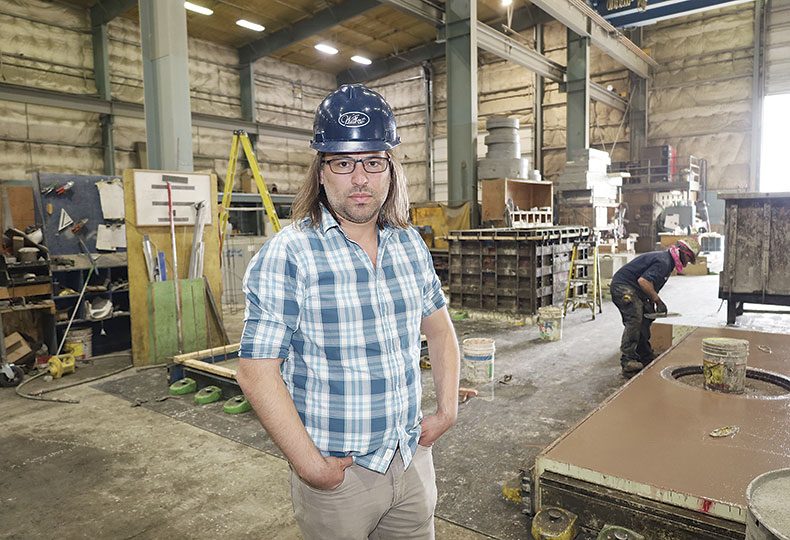Catching up with Spokane manufacturer Wilbert Precast
Company foresees growth under its fifth generation of family leadership

TJ Houk represents the fifth generation of leadership at Spokane concrete manufacturing company Wilbert Precast Inc.
| Mike McLeanWilbert Precast Inc. is growing and diversifying its product line as the Spokane-based concrete-products manufacturer nears 120 years in business, says CEO TJ Houk, who represents the fifth generation of family leadership in the company.
His father, Dan Houk, 65, this week announced his retirement from day-to-day operations with the company after a soft transition. He retains the position of chairman of the board, following a 43-year career with Wilbert Precast.
The Journal last published a feature article on Wilbert Precast about 15 years ago, when Dan Houk described how the company remained stable during the Great Recession, due largely to its expanding product line, much of which is targeted to infrastructure construction.
TJ Houk, a Gonzaga University alum, joined the company in 2021, after an 11-year stint in corporate finance.
He declines to disclose revenue figures for Wilbert Precast, but says, “This year is an accelerating growth year. We’ve been on a pretty consistent growth pace over the last several years.”
Among its many products, Wilbert Precast manufactures window wells, dry wells, catch basins, retaining wall blocks, light poles, septic tanks, box culverts, maintenance hole structures, and many custom items.
The company recently partnered with Vessel Pools, of Spokane, to pioneer a new swimming pool design.
“It’s a precast pool that they’ll be able to just sit with a crane, completely finished, in somebody’s backyard,” he says.
Wilbert Precast also is manufacturing security wall panels recently developed by Spokane-based Avista Corp.
The company’s products range in size from concrete parking bumpers to bridge deck components. The size of products produced by Wilbert Precast are limited only by what can be transported by truck.
“What we can handle in the building is up to 60,000 pounds,” Houk says.
During the summer, a few dozen trucks of all sizes haul products from the Spokane plant.
“Our fleet is about 20 trucks, and then a lot of our customers pick up their own products,” he says.
Precast has certain advantages over onsite pouring, Houk contends. For example, production isn’t limited to the construction season.
“It’s done in a controlled environment with quality control, and we can produce around the year,” he says. “Products that are produced in advance that can support construction are going to become more valuable—and more needed.”
Wilbert Precast is headquartered at 2215 E. Brooklyn, in northeast Spokane, where its roughly 16-acre complex that straddles Brooklyn Avenue includes a 27,000-square-foot manufacturing plant, a 3,000-square-foot office building, a service garage, and a welding shop. Much of the rest of the complex consists of storage yards for Wilbert Precast’s manufactured products, Houk says.
Under his father’s tenure, the company’s headquarters moved to its current location from a smaller site at 1323 N. Cedar in 2001. Wilbert Precast also constructed precast plants in Yakima, Washington, and Lewiston, Idaho, between 1999 and 2001.
Wilbert Precast currently has a workforce of about 140, with 76 of those employees based at the Spokane plant.
“We’re eager to grow, so I would expect that number to grow over time,” he says of the Wilbert Precast workforce. “We have an awesome team, and we’re proud of the people we have found. … (We’re) so fortunate to have a number of folks who have been around for 30-plus years in this business”
Houk’s great-great grandfather, John Shopf, and his brother, Henry Schopf, founded the company as Spokane Concrete Vault Co. in 1906. Houk’s grandfather changed the company’s name to Spokane Wilbert Vault Co. in 1961 to focus on the Wilbert brand of burial vault. In 1977, the company began its diversification into other products, starting with septic tanks, and the name was later changed to Wilbert Precast.
Burial vaults currently make up a fraction of the company’s production, and no single product makes up more than 10% of the company’s output, Houk says.
His brother and sister, Andy and Christy Houk, aren’t current employees of the company, although they are board members. His mother, Lori, rounds out the five-member board.
As for the potential for a sixth generation of family leadership, Houk, who, at 36, is the oldest of the fifth-generation siblings and has no children, says, “We’re a long way from looking at that.”





